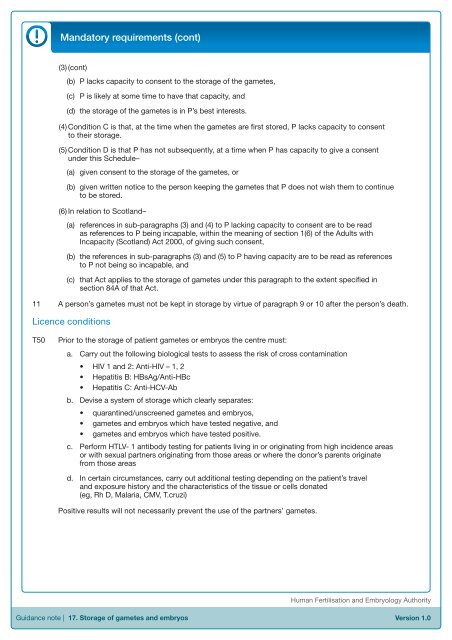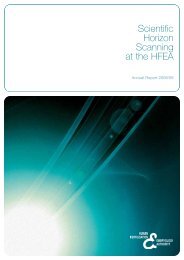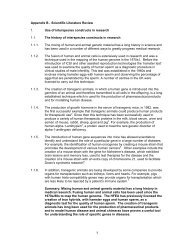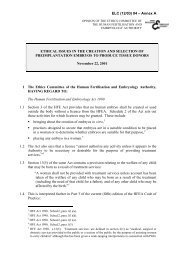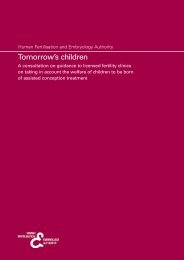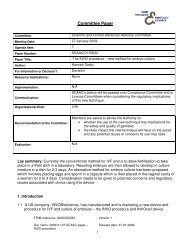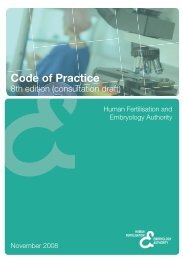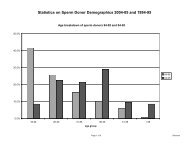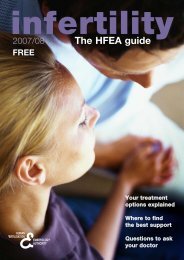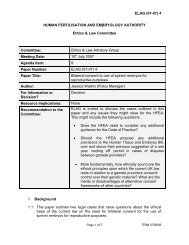Eighth Edition - R.3 - Human Fertilisation & Embryology Authority
Eighth Edition - R.3 - Human Fertilisation & Embryology Authority
Eighth Edition - R.3 - Human Fertilisation & Embryology Authority
Create successful ePaper yourself
Turn your PDF publications into a flip-book with our unique Google optimized e-Paper software.
Mandatory requirements (cont)<br />
(3) (cont)<br />
(b)<br />
P lacks capacity to consent to the storage of the gametes,<br />
(c)<br />
(d)<br />
P is likely at some time to have that capacity, and<br />
the storage of the gametes is in P’s best interests.<br />
(4) Condition C is that, at the time when the gametes are first stored, P lacks capacity to consent<br />
to their storage.<br />
(5) Condition D is that P has not subsequently, at a time when P has capacity to give a consent<br />
under this Schedule–<br />
(a)<br />
given consent to the storage of the gametes, or<br />
(b)<br />
given written notice to the person keeping the gametes that P does not wish them to continue<br />
to be stored.<br />
(6) In relation to Scotland–<br />
(a) references in sub-paragraphs (3) and (4) to P lacking capacity to consent are to be read<br />
as references to P being incapable, within the meaning of section 1(6) of the Adults with<br />
Incapacity (Scotland) Act 2000, of giving such consent,<br />
(b)<br />
(c)<br />
the references in sub-paragraphs (3) and (5) to P having capacity are to be read as references<br />
to P not being so incapable, and<br />
that Act applies to the storage of gametes under this paragraph to the extent specified in<br />
section 84A of that Act.<br />
11 A person’s gametes must not be kept in storage by virtue of paragraph 9 or 10 after the person’s death.<br />
Licence conditions<br />
T50<br />
Prior to the storage of patient gametes or embryos the centre must:<br />
a. Carry out the following biological tests to assess the risk of cross contamination<br />
HIV 1 and 2: Anti-HIV – 1, 2<br />
Hepatitis B: HBsAg/Anti-HBc<br />
Hepatitis C: Anti-HCV-Ab<br />
b. Devise a system of storage which clearly separates:<br />
quarantined/unscreened gametes and embryos,<br />
gametes and embryos which have tested negative, and<br />
gametes and embryos which have tested positive.<br />
c. Perform HTLV- 1 antibody testing for patients living in or originating from high incidence areas<br />
or with sexual partners originating from those areas or where the donor’s parents originate<br />
from those areas<br />
d. In certain circumstances, carry out additional testing depending on the patient’s travel<br />
and exposure history and the characteristics of the tissue or cells donated<br />
(eg, Rh D, Malaria, CMV, T.cruzi)<br />
Positive results will not necessarily prevent the use of the partners’ gametes.<br />
<strong>Human</strong> <strong>Fertilisation</strong> and <strong>Embryology</strong> <strong>Authority</strong><br />
Guidance note | 17. Storage of gametes and embryos<br />
Version 1.0


